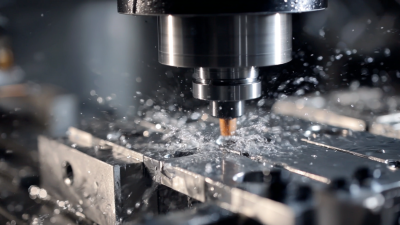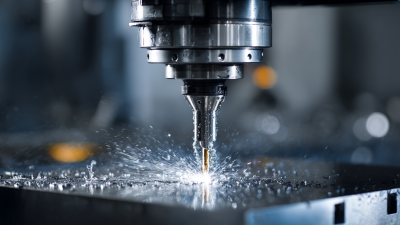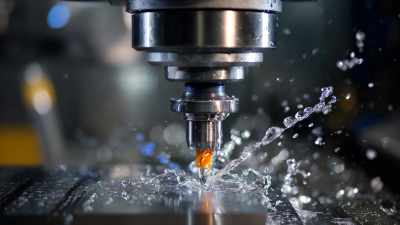
- sales@bjbod.com
- Mon - Sat at 7:00AM to 9:00PM

 In the landscape of modern manufacturing, the integration of Metal CNC technology stands out as a pivotal advancement in precision engineering. According to a report by Grand View Research, the global CNC machine market is expected to reach $100 billion by 2025, driven by the increasing demand for high-quality machining processes across various industries. Metal CNC machining offers unparalleled accuracy, efficiency, and the ability to produce complex geometries, making it essential for sectors such as aerospace, automotive, and medical devices. The application of advanced Metal CNC techniques not only enhances productivity but also reduces waste, leading to a more sustainable manufacturing approach. As industries lean into this technological revolution, the significance of adopting Metal CNC solutions becomes increasingly clear, marking a transformative shift in how precision engineering is executed worldwide.
In the landscape of modern manufacturing, the integration of Metal CNC technology stands out as a pivotal advancement in precision engineering. According to a report by Grand View Research, the global CNC machine market is expected to reach $100 billion by 2025, driven by the increasing demand for high-quality machining processes across various industries. Metal CNC machining offers unparalleled accuracy, efficiency, and the ability to produce complex geometries, making it essential for sectors such as aerospace, automotive, and medical devices. The application of advanced Metal CNC techniques not only enhances productivity but also reduces waste, leading to a more sustainable manufacturing approach. As industries lean into this technological revolution, the significance of adopting Metal CNC solutions becomes increasingly clear, marking a transformative shift in how precision engineering is executed worldwide.
 Advanced Metal CNC (Computer Numerical Control) technology is redefining the standards of precision engineering across various industries. As companies increasingly seek to enhance productivity while maintaining high-quality outputs, the adoption of advanced CNC machines has become essential. According to industry reports, the CNC machine market size is expected to reach significant growth by 2032, driven by the rising demand for high precision and efficiency in manufacturing processes. These machines not only enable intricate designs and fine tolerances but also facilitate the transition from conventional operations to more automated solutions.
Advanced Metal CNC (Computer Numerical Control) technology is redefining the standards of precision engineering across various industries. As companies increasingly seek to enhance productivity while maintaining high-quality outputs, the adoption of advanced CNC machines has become essential. According to industry reports, the CNC machine market size is expected to reach significant growth by 2032, driven by the rising demand for high precision and efficiency in manufacturing processes. These machines not only enable intricate designs and fine tolerances but also facilitate the transition from conventional operations to more automated solutions.
The shift towards digital manufacturing technologies underscores the necessity for eco-friendly, cost-effective machine operations. Advanced metal CNC technology is particularly appealing for its ability to reduce material waste and improve energy efficiency, aligning manufacturing practices with sustainability goals. As various sectors leverage these innovations, the emphasis on achieving precise engineering outcomes while optimizing production workflows will continue to shape the future of manufacturing. The integration of automated CNC solutions promises a new era of precision, where speed and accuracy are paramount in meeting the evolving demands of the market.
The implementation of advanced CNC technology in manufacturing is transforming precision engineering, enhancing efficiency, and elevating product quality. One of the key benefits is the remarkable accuracy CNC machines provide. These machines operate based on computer-aided designs, allowing for intricate shapes and dimensions to be consistently produced with minimal human error. As a result, manufacturers can meet stringent tolerances and specifications, which is especially critical in industries such as aerospace, automotive, and medical devices.
Moreover, CNC technology streamlines production processes and reduces lead times. With automated machinery, manufacturers can run operations 24/7 with minimal downtime, enabling faster turnaround times for orders. This automation not only accelerates manufacturing but also allows skilled operators to focus on more complex tasks that require human insight, thereby optimizing workforce efficiency. As companies adopt CNC technology, they experience a significant increase in overall productivity, which ultimately enhances their competitive edge in the market.
Transitioning to advanced CNC systems is a crucial step for manufacturers aiming to enhance precision and efficiency in their operations. The move from traditional machining methods to automated processes, particularly in sectors like footwear manufacturing, showcases how technologies such as 3D scanning and computer numerical control can significantly improve production quality. By adopting these advanced techniques, companies can achieve greater accuracy and reduce lead times, positioning themselves competitively in the market.
Tips: Start by assessing your current manufacturing processes and identifying areas for improvement. A comparison with industry standards can illuminate gaps and opportunities for incorporating CNC technology. Additionally, invest in training for your workforce to ensure they are proficient in the latest systems—this not only enhances productivity but also fosters a culture of innovation within your company.
As industries evolve, adopting intelligent tools such as GRBL software can facilitate the integration of CNC machines into existing workflows. This open-source firmware allows for precise control, making it an excellent resource for organizations transitioning to automated machining. Leveraging these technologies can streamline operations and prepare businesses for the future of manufacturing, where adaptability and precision are key.
The CNC machining market is on the verge of a significant transformation, with a projected growth from $101.22 billion in 2025 to $195.59 billion by 2032, reflecting a compound annual growth rate of 9.9%. This expansion underscores the increasing importance of precision engineering in manufacturing processes, particularly in industries such as aerospace and automotive, where even the slightest tolerance can affect performance.
To achieve precision in CNC machining, employing advanced techniques and best practices is essential. One effective approach is to regularly calibrate and maintain your CNC machines to ensure optimal performance. Additionally, utilizing high-quality materials and tools tailored for the specific application can significantly enhance the machining process's accuracy.
Tip: Always perform a thorough analysis of your workflow and identify areas for automation, as this can reduce human error and increase productivity. Integrating software that facilitates real-time monitoring and data analysis can also help in maintaining the quality of the machined parts, ensuring they meet stringent industry standards. Emphasizing these practices will not only elevate product quality but also position companies favorably in the competitive manufacturing landscape.
The integration of advanced CNC technology is reshaping the manufacturing landscape, driving enhanced efficiency and precision across various sectors. By adopting new digital manufacturing technologies, industries can streamline production processes, reduce waste, and achieve tighter tolerances in their products.
 Automation and real-time data analytics are pivotal in this evolution, allowing manufacturers to optimize workflows and respond swiftly to market demands.
Automation and real-time data analytics are pivotal in this evolution, allowing manufacturers to optimize workflows and respond swiftly to market demands.
Future trends in CNC technology indicate a significant shift towards greater customization and adaptability. The rise of smart manufacturing, powered by the Internet of Things (IoT) and artificial intelligence (AI), is set to revolutionize traditional practices. These innovations enable manufacturers to harness data like never before, leading to informed decision-making and proactive maintenance, ultimately resulting in increased productivity.
As industries continue to embrace these advancements, the emphasis on precision engineering will only grow, paving the way for a more efficient and responsive manufacturing ecosystem.





